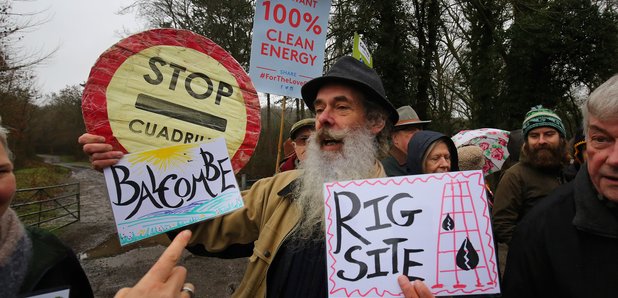
Tonight with Andrew Marr 6pm - 7pm
20 August 2013, 12:21 | Updated: 28 October 2019, 15:53

Hundreds of demonstrators are camped outside the tracking investigation site in Balcombe, Sussex.
They are protesting against the government's plans to mine the natural gas in the rocks under Britain's countryside. The government claim it will lead to cheaper bills, but critics say it is reckless and dangerous.
So how dangerous is it? Can fracking create earthquakes? Find out everything you need to know about tracking below.
Fracking is short for "Hydraulic Fracturing" and involves drilling down into the earth and firing a high-pressure mixture of water, sand and chemicals into the rock to release the shale gas inside.
The use of tracking in the USA has prompted environmental concerns. Protesters claim that fracking:
- Uses huge amounts of water
This water, sand and chemicals must be transported to the fracking site by lorry causing significant environmental issues. Each fracking well needs millions of litres of water, leading to fears of more droughts.
- Concern that carcinogenic chemicals may escape into groundwater
The water injected into the rock is mixed with sand and chemicals and some of these chemicals resurface as hazardous waste. The industry suggests pollution incidents are the results of bad practice, rather than an inherently risky technique and there are no proven cases of groundwater contamination.
- Worries that tracking could cause earthquakes
Injecting water into the underground rock increases pressure on seismic faults, making them more likely to slip. However, the tremors produced by fracking are generally so small that you won't even notice them. Cuadrilla's first exploratory site in Lancashire registered two earthquakes, measuring 2.3 and 1.5 on the Richter scale, neither of which caused any damage, but were large enough to cause concern.
- Distracting the government from investing in renewable energy
Critics claim that focusing on more fossil fuels will add to climate change while we should be looking at renewable sources, such as wind, wave and solar energy.
Fracking is common in the USA and has significantly boosted domestic oil production, driving down gas prices. This is believed to have given the USA and Canada gas security for about 100 years with half the CO2 emissions of coal.
In the UK, a report by the Energy and Climate Change Committee in April said shale gas in the UK may help to secure energy supplies, but may not bring down gas prices.
No fracking is currently taking place, other than exploratory drilling in places like Balcombe in Sussex.
But reserves of shale gas have been identified across large parts of the UK, especially in the north of England and firms have applied for licenses to drill for the gas.